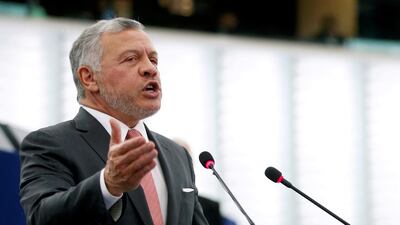Jordan's King Abdullah on Tuesday met religious leaders from different churches around the Middle East to discuss the safeguarding of Jerusalem's holy sites.
He met the church leaders and representatives of the Awqaf religious foundation that protects the sites.
During the meeting, the ruler stressed the historical and religious responsibility of Jordan's custodianship of Christian and Muslim holy sites in Jerusalem.
He reaffirmed his support for all Jerusalemites and their efforts to preserve the Arab and Islamic identity of the holy city.
“We will not accept any compromise over Jerusalem and its holy sites. We continue to follow the approach of our parents and grandparents of the Hashemite Kings, who sacrificed to preserve the Islamic and Christian sanctities,” King Abdullah said.
The Palestinian delegation expressed its appreciation of the king's efforts to preserve the historical identity of Jerusalem.
They, alongside Christian representatives from the Holy Land, highlighted the importance of Hashemite custodianship.
“It is important to reiterate the historical and actual role that the Hashemite House plays for the city of Jerusalem, as a guarantor of the equality of all its citizens, of all faiths, who have in their holy places, places of prayer, of welcome, of peaceful encounter and not a battleground,” Archbishop Pierbattista Pizzaballa, Latin Patriarch of Jerusalem, said.
The meeting comes on the heels of tensions in Jerusalem after nightly clashes between Israeli police and Arab and Palestinian residents at the start of Ramadan. The friction started after authorities set up barricades to stop the traditional gatherings at the Old City’s Damascus Gate.
Last week, tensions ran high in East Jerusalem after Israeli police clashed with Palestinians outside the Old City and Jewish extremists tried to stage a march to the area.
Police tried to keep them apart from the Palestinian protesters, but by the end of the night, more than 50 people had been arrested. The Palestine Red Crescent Society said 100 Palestinians were wounded.
Israel's Arab neighbours were quick to condemn the extremists' actions, with the Jordanian and Egyptian foreign ministers calling on Israel to do a better job of tackling anti-Arab racism within its borders.
On Sunday, Palestinians removed the metal barriers from the steps of the Damascus Gate, after police pledged to "lower the level of violence".
Jerusalem is home to sites sacred to Jews, Christians and Muslims, including the Al Aqsa Mosque – the third-holiest site in Islam, and has long been a flashpoint for Israeli-Palestinian violence.










